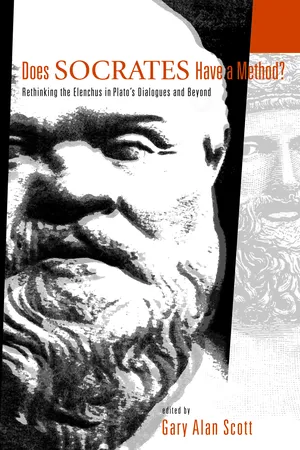
Does Socrates Have a Method?
Rethinking the Elenchus in Plato's Dialogues and Beyond
- 344 pages
- English
- PDF
- Available on iOS & Android
Does Socrates Have a Method?
Rethinking the Elenchus in Plato's Dialogues and Beyond
About This Book
Although "the Socratic method" is commonly understood as a style of pedagogy involving cross-questioning between teacher and student, there has long been debate among scholars of ancient philosophy about how this method as attributed to Socrates should be defined or, indeed, whether Socrates can be said to have used any single, uniform method at all distinctive to his way of philosophizing. This volume brings together essays by classicists and philosophers examining this controversy anew.
The point of departure for many of those engaged in the debate has been the identification of Socratic method with "the elenchus" as a technique of logical argumentation aimed at refuting an interlocutor, which Gregory Vlastos highlighted in an influential article in 1983. The essays in this volume look again at many of the issues to which Vlastos drew attention but also seek to broaden the discussion well beyond the limits of his formulation.
Some contributors question the suitability of the elenchus as a general description of how Socrates engages his interlocutors; others trace the historical origins of the kinds of argumentation Socrates employs; others explore methods in addition to the elenchus that Socrates uses; several propose new ways of thinking about Socratic practices. Eight essays focus on specific dialogues, each examining why Plato has Socrates use the particular methods he does in the context defined by the dialogue. Overall, representing a wide range of approaches in Platonic scholarship, the volume aims to enliven and reorient the debate over Socratic method so as to set a new agenda for future research.
Contributors are Hayden W. Ausland, Hugh H. Benson, Thomas C. Brickhouse, Michelle Carpenter, John M. Carvalho, Lloyd P. Gerson, Francisco J. Gonzalez, James H. Lesher, Mark McPherran, Ronald M. Polansky, Gerald A. Press, François Renaud, and W. Thomas Schmid, Nicholas D. Smith, P. Christopher Smith, Harold Tarrant, Joanne B. Waugh, and Charles M. Young.
Frequently asked questions
Information
Table of contents
- Front Cover
- Copyright Page
- Contents
- Abbreviations for Plato’s Dialogues
- Preface
- Introduction
- Part One: Historical Origins of Socratic Method
- Part Two: Reexamining Vlastos’s Analysis of “the Elenchus”
- Part Three: Socratic Argumentation and Interrogation in Specific Dialogues
- About the Contributors
- Works Cited
- Index
- Back Cover